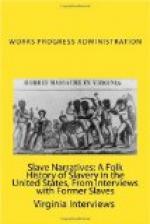The subject of this sketch is a pure blooded Negro, whose kinky hair is now white, likewise his scraggy beard. He is of medium size and somewhat stooped with age, but still active enough to plant and tend a patch of corn and the chores about his little place at Sugarlands. His home is a small cabin with one or two rooms upstairs and three down, including the kitchen which is a leanto. The cabin is in great disrepair.
Phillip John is above the average in intelligence, has some education and is quite well versed in the Holy Scriptures, having been for many years a Methodist preacher among his people. He uses fairly good English and freely talks in answer to questions. Without giving the questions put to him by this writer, his remarks given in the first person and as near his own idiom are as follows:
“I’ll be ninety years old next December. I dunno the day. My Missis had the colored folks ages written in a book but it was destroyed when the Confederate soldiers came through. But she had a son born two or three months younger than me and she remember that I was born in December, 1847, but she had forgot the day of the month.
“I was born down on the river bottom about four miles below Edwards’ Ferry, on the Eight Mile Level, between Edwards’ Ferry and Seneca. I belonged to ole Doctah White. He owned a lot o’ lan down on de bottom. I dunno his first name. Everybody called him Doctah White. Yes, he was related to Doctah Elijah White. All the Whites in Montgomery County is related. Yes sah, Doctah White was good to his slaves. Yes sah, he had many slaves. I dunno how many. My Missis took me away from de bottom when I was a little boy, ’cause de overseer he was so cruel to me. Yes sah he was mean. I promised him a killin if ever I got big enough.
“We all liked the Missis. Everybody in dem days used to ride horseback. She would come ridin her horse down to de bottom with a great big basket of biscuits. We thought they were fine. We all glad to see de Missis a comin. We always had plenty to eat, such as it was. We had coarse food but there was plenty of it.
“The white folks made our clothes for us. They made linsey for the woman and woolen cloth for de men. They gave clothes sufficient to keep em warm. The men had wool clothes with brass buttons that had shanks on em. They looked good when they were new. They had better clothes then than most of us have now.
“They raised mostly corn an oats an wheat down on de river bottom in those days. They didn’t raise tobacco. But I’ve heard say that they used to raise it long before I was born. They cut grain with cradles in dem days. They had a lot ’o men and would slay a lot ’o wheat in a day. It was pretty work to see four or five cradlers in a field and others following them raking the wheat in bunches and others following binding them in bundles. The first reapers that came were called Dorsey reapers. They cut the grain and bunched it. It was then bound by hand.




